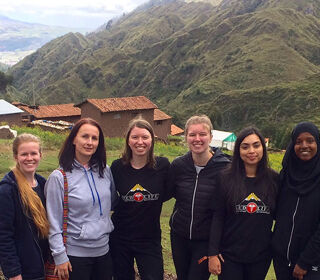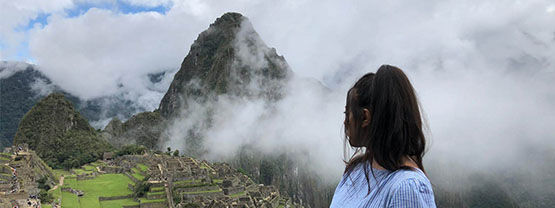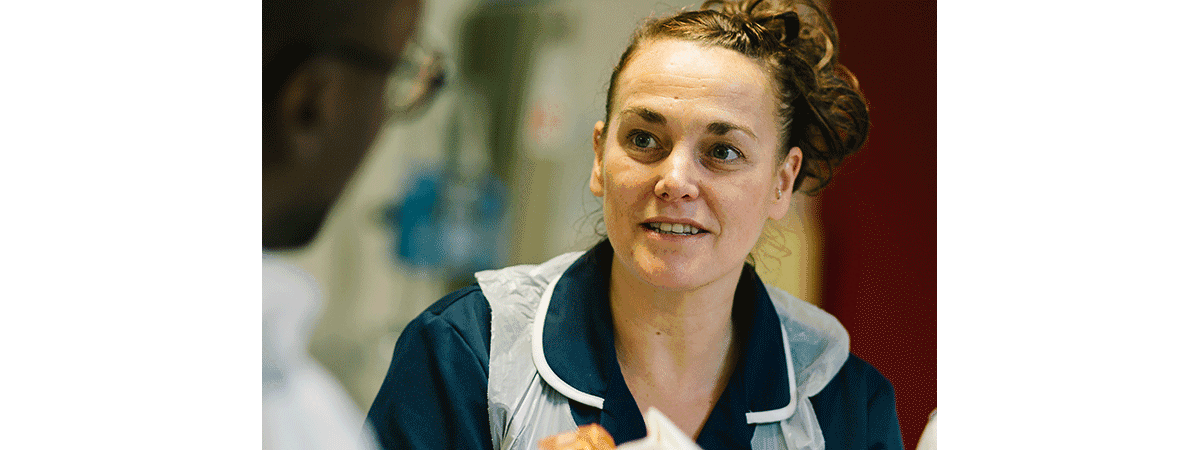
Blog

We are fortunate to have a strong partnership with MEDLIFE, a charity with a mission to build a worldwide movement empowering the poor in their fight for equal access to healthcare, education and a safe home all across the world. Our Child Nursing students, Kushbu Lad and Jade Fensom got the opportunity to visit South America with MEDLIFE recently.
This opportunity was facilitated by the Faculty’s HELS Go Abroad scheme and 8 other students across the School of Nursing & Midwifery and School Health Sciences also took part. Here are their thoughts:
Why did you choose this international activity and country?
Kushbu: I chose this opportunity because of what MEDLife stand for. To provide support and promote independence to low income families in rural areas focusing on key areas of medicine, education and development. It was portrayed as an amazing experience, I had never come across anything like it before, being able to integrate my nursing skills in an international community-based environment.
Jade: I wanted to learn about a different culture and about a healthcare system in a less developed country than the UK. I have never been outside of Europe before and always been interested in doing work in South America, as I have family there and an understanding that there are limited resources in Peru and a different way of life to us here in the UK. I always chose this activity because I knew it would help me build skills, I can transfer into my studies such as communication, team working and healthcare skills/ outlook.
What did you enjoy most about your time spent overseas? Is there anything you did not enjoy?
Kushbu: I enjoyed the whole journey. 10 students were chosen from the HELS faculty, on different courses and different academic years, which was a nice mix. From providing a service in Lima, geographically labelled as a desert to serving in Cusco, a famous city in the Andes. We attended different communities every day to provide healthcare, which was divided into clinics of: triage, dentistry, pharmacy, education, gynaecology, tooth brushing, handwashing and occasionally opticians. One day in the week was allocated to development which would allow us to support a community that MEDLife were currently working with. MEDLife, together with the community leader identified the needs to provide safer living and promote independence.
In Lima, our project focused on building staircases for a safer commute for employment and schooling. It also provided a pathway for electricity to reach homes who lived at higher altitude. In Cusco, different needs were identified, focusing on safer living in the home by building corn dryers to enable the community to store crops outside with prevention of deterioration from the weather. Another aspect of the safer living project was painting homes for families and children.
Jade: I enjoyed experiencing community health care clinics in a completely new community and country, working in a team of different healthcare students and volunteers. I enjoyed the exposure to different healthcare conditions and looking after a range of different people especially because I study Child Nursing, on this activity I looked after adults, older people and children. I experienced and learnt about pap tests, breast exams, HIV testing, dental fillings and extractions and help a pharmacist give medications I was not usually exposed to in my work.
During the clinics, something that ‘didn’t sit right’ with me, was that on one clinic in Cusco, people had travelled so far and a doctor was in this community only once every 6 months, but because of time and our resources we could not see everyone and had to eventually turn people away. It just made me wonder when the next time these people would get access to health care or help, they need, or would they go without.
What differences have you observed? Is there anything about your international experience that surprised you?

Kushbu: I think the whole experience surprised me. The experience was so raw and authentic. We saw first-hand from the reality tour how residents in Lima lived and in Cusco. No sewage. No electricity. No immediate access to water. A graveyard on their doorstep. We were educated on the causes, their perceptions, religion, history and politics. The same for Cusco, although we were in the same country, everything was different. Again, we had to adjust. Lima is the capital, it’s hot, by the sea known for its surf. Cusco, a historical town of the Incas. It was cold and it rained, and nearly 4000ft above sea level with reduced oxygen levels. The needs differed massively.
Spanish was the main language used in Peru, however locals in Cusco spoke Ketchuwa. Barriers between citizens were identified, transport being so high up in the mountains became a barrier, access to treatments, facilities and professionals were limited. Consequences of farming and exposure to radiation being so high up exposed their health risks. The communities in the Andes were few and far between. Residents would travel miles even days to attend a health clinic, something we largely take for granted. The people were immensely grateful, it was beautiful to see.
Jade: Going into the trip just knowing that Peru had less access to healthcare, but I did not know exactly what to expect. I was not expecting them to have as much as they did, but also that a big issue in Lima was malnutrition, but for other reasons than I would assume; eating of the wrong food groups and overweight/ obesity was very common. There was a lot of lack of education, particularly around health promotion and knowledge of health needs. Therefore, providing education as well as health care was just as important. In Lima, there was a lack of knowledge around nutrition and STI awareness. Whereas, in Cusco there was a lot of service users needing medication due to iron deficiency.
What do you think you achieved from this international experience? Did you develop any new skills?
Kushbu: The depth of my awareness and appreciation for what we have in the UK and for people of the world has shifted. The experience has been able to identify my own personal strengths and weaknesses and enhanced my skills of communication, adaptability, flexibility, problem solving, self – management and open mindedness. It has surfaced my perseverance and determination to develop, evolve and continue my journey in nursing and experience of the world.
Jade: I feel I gained a lot of confidence in what I know regarding nursing here for NHS, as I was able to point out things that I had learnt and help correct things, such as privacy, comfort and dignity. Also, I gained more confidence with my communication skills, as the language in Peru is Spanish and in Cusco occasional Quechua, there was a language barrier but I learnt a basic amount of Spanish in my first few days there and then used pointing or pictures to help me communicate, emphasising communication is not always just verbal. Furthermore, I gained more knowledge about healthcare practice and a broader perspective of global healthcare issues.
What advice would you like to give to students considering this trip next year?
Kushbu: My advice for this trip is there’s no such thing as being over prepared. If you do both Lima and Cusco, be mindful that you may have to pack for all weathers. Ensure that you pack medications, have insurance and be mindful of your physical and mental capabilities and limits. It’s okay to rest! Plan ahead academically! Do your research! Remember to enjoy the journey, the moments you embark will be beautiful. Immerse yourself with the culture and the people; the truest form to get the most out of your experience. And if you’re hesitant... the answer is yes!
Jade: I advise students to do it 100%, it is such a good opportunity to volunteer in a new place and see things I never thought I would in a beautiful country. I met and made some friends for life on this trip and learnt skills I am humbled to have learnt.




